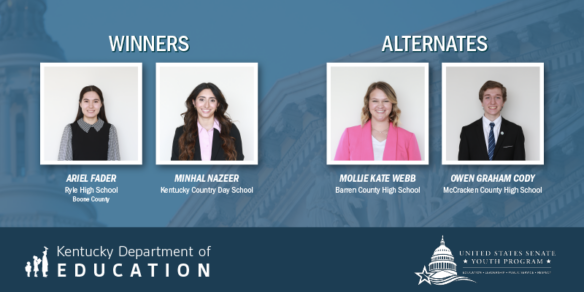
Ariel Fader, a senior at Ryle High School (Boone County), and Minhal Nazeer, a senior at Kentucky Country Day School (Jefferson County), were selected from among the state’s top student leaders to be part of the national 104-student delegation of the United States Senate Youth Program (USSYP). Fader and Nazeer also will each receive a $10,000 college scholarship for undergraduate study from The Hearst Foundations.
The students will represent Kentucky during the 62nd annual USSYP Washington Week, to be held March 2-9.
“The U.S. Senate Youth Program creates experiences that engage, inspire and unlock leadership potential,” said Robin Fields Kinney, Kentucky’s interim commissioner of education. “I congratulate these students on their selection for this opportunity.”
Mollie Kate Webb, a senior at Barren County High School, and Owen Graham Cody, a senior at McCracken County High School, were chosen as alternates to the 2024 program and may be asked to serve if a primary delegate is unable to participate.
The selection process for the program is rigorous and includes an application, interview and public affairs examination. Two high school juniors or seniors are selected each year from each state, the District of Columbia and the Department of Defense Education Activity. Delegate selection is administered by each state’s chief school officer in coordination with high school principals.
Fader and Nazeer both have records of strong leadership, academic achievement and commitment to service.
Fader is the 2023-2024 National Technology Student Association (NTSA) treasurer. She said she likes to lead by collaboration and has a passion for advocating for equity. A national competitor and captain of her school’s speech and debate team, Fader founded The SpeakOut Campaign, a national student-run organization dedicated to making public speaking education accessible and improving civic engagement among youth.
As the NTSA’s central region president, she collaborates with other association officers to organize conferences, share resources and promote service and fundraising. Fader also is INTERalliance’s chief chapters officer, where she works with schools in three states to help students explore opportunities in STEM. INTERalliance inspires high schoolers to pursue a career in IT.
Her accomplishments include being named a Coolidge Scholarship Senator, Bill of Rights Institute National Fellow and Million Girls Moonshot Flight Crew member. She was accepted to both the Governor’s School for Arts in two disciplines and the Governor’s School for Entrepreneurs. Fader plans to pursue a college degree in computer science and attend law school.
Nazeer spent time between her grandparents’ homes in Pakistan and Kentucky, which she said catalyzed her mission for humanitarian causes and social activism through an equity lens. She learned about the history of inequality in her city and current measures to combat that legacy through her work with the Louisville Youth Philanthropy Council and the Muhammad Ali Center Council of Students.
She saw a need for youth voices while volunteering with local political campaigns. She is the research lead with the Kentucky Student Voice Team (KSVT) on a project that seeks to amplify and elevate student experiences and responses to diversity, equity and inclusion in schools. Her work with KSVT also shaped her belief that students are experts in their own educational experiences.
Nazeer was elected Honor Council president at her school, which includes overseeing consequences for honor code violations. She also is her school’s student council president and a four-year varsity volleyball team member.
The USSYP program, created by Senate Resolution 324 in 1962, is sponsored by the Senate and fully funded by The Hearst Foundations. The program brings the most outstanding high school students from around the nation to Washington, D.C., for an intensive weeklong study of the federal government and the people who lead it.
The USSYP Washington Week program agenda routinely includes student meetings with senators, the president, Cabinet secretaries, a justice of the Supreme Court, senior members of the national media and other key policymakers.




Leave A Comment